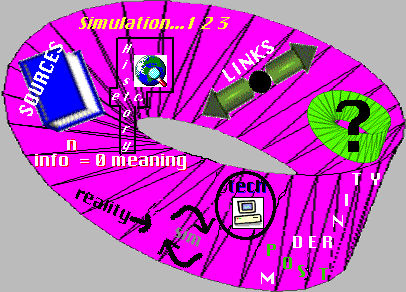
So there is an odd chain reaction, whereby simulations have taken over for reality, but now generate nothing but more simulations:

This "fall" into simulations is exacerbated by the masses and media. The public prefer spectacles to reality. We would rather go to Disneyworld than to work. When we watch the news, we would rather be entertained than informed. The consequence of this preference is that reality loses its status, and that the effectiveness of simulation is greater than the potency of reality.
In his essay on holograms, Baudrillard points out that we have a passion for "seizing reality live" (Baudrillard 105), for appropriating the real and immobilizing it. Interestingly, the only time we can do this (with holograms, at least) is right at the threshold between the real and the simulated image.


